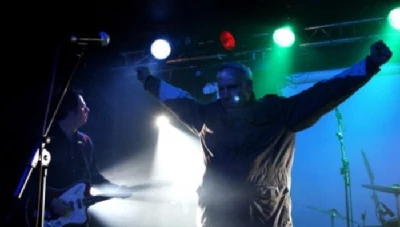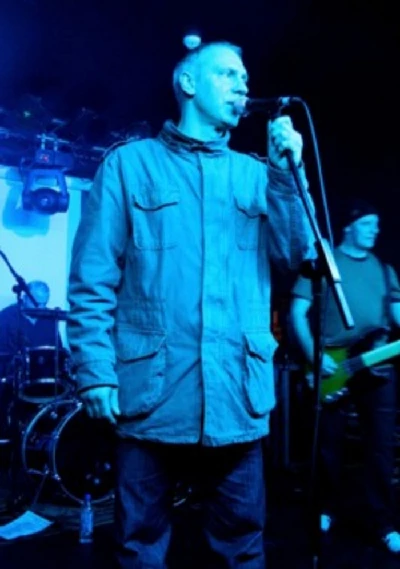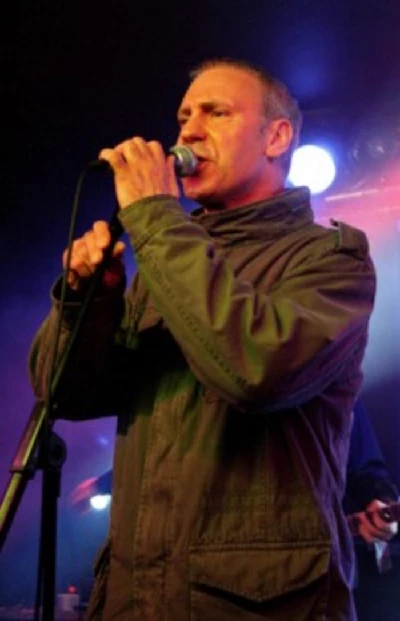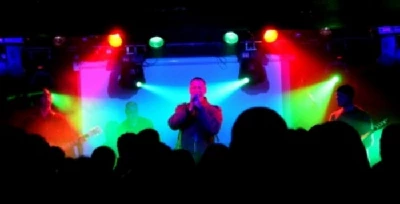published: 19 /
3 /
2009
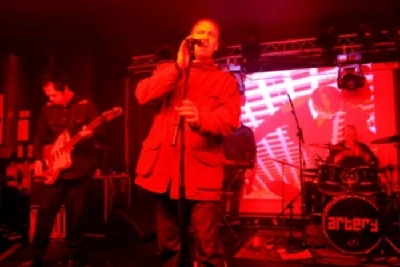
One of the unsung bands of the post punk era, Artery recently reformed after being invited to play Jarvis Cocker's Meltdown Festival. Singer Mark Goldthorpe speaks to John Clarkson about his group's original career in the early 80s and their first EP of new material in 25 years, 'Standing Still'
Article
Artery have been described by Jarvis Cocker as being one of “the great unsung bands of the post punk era.” Attracting a fervent audience in their native Sheffield, their impact was such on the young pre-Pulp Cocker that he has said about a typically intense Artery gig in 1980 that it had provided him with “one of the most important concerts of (his) life.”
In its original existence between 1978 and 1985, Artery went through several permutations. Its angst-ridden, often sinister-voiced singer Mark Goldthorpe and tribally rhythmic drummer Gary Wilson were both mainstays, remaining with the group throughout. Keyboardist Simon Hinkler, who would later go on the find fame as the guitarist in the Mission, however, left and rejoined the group several times, while the roles of guitarist and bassist were both permanently rotating wheels, being vacated and then filled on numerous occasions.
Artery received recognition from John Peel who placed their song, ‘Into the Garden’, at number 9 in his Festive 50 of 1982. Moving through a variety of styles that saw them develop from garage punks to shredded-nerved minimalists to Brechtian-style theatricalists and avant-garde experimentalists, they also recorded seven other singles and four albums, ‘Oceans’ (Red Flame, 1982), ‘One Afternoon in a Hot Air Balloon’ (Red Flame, 1983), ‘The Second Coming’ (Golden Dawn, 1984) and ‘Number 4’ (Golden Dawn, 1985).
They, however, were never able to break out into the mainstream, and a part of the era that saw the rise of other more pop-oriented Sheffield acts such as ABC, the Human League and Heaven 17, might have remained a footnote in that city’s musical history if it had not been for the interjection of Jarvis Cocker who personally invited them to reform for his curation of the 2007 Meltdown Festival.
A largely original line-up of Artery including both Goldthorpe and Wilson has now released its first new studio material in nearly 25 years, the four song ‘Standing Still’ EP, on Denzil Watson’s local Phantom Power Records. It is a fraughtly powerful piece, which set against a backdrop of cascading synthesisers and jagged guitars, has Mark Goldthorpe on fiesty lyrical form as he depicts a world of segregated cultures and barriers and teetering on a precipice of technological and environmental overload.
In an interview with Pennyblackmusic, he talked to us about Artery’s reformation and renewed sense of energy and purpose. At first we began though by asking him about the group’s early years in the late 1970s and early 1980s.
PB : Artery was always phenomenally popular in Sheffield. How well were you received beyond there and in London and the rest of the UK ?
MG : We briefly did quite well in London. Two things happened in our early history there. We did a gig at a post-punk festival at the ICA in London and Steve Sutherland, who was features editor at ‘Melody Maker’ at the time and who eventually became editor of the ‘NME’, was there and absolutely loved us. He did a fantastic review of our gig and he also wanted to do a feature, so we ended up being interviewed by him for ‘Melody Maker’. At the same time as that was happening John Peel also began to express an interest, so we did a session for him as well.
Both those things were big boosts for our confidence. As the lyricist I thought anyway I was writing about things that were important, not just to me, but to the time, and as a band we thought the songs were strong, but the fact that people like Steve Sutherland and John Peel saw something in us really helped us believe in what we were doing.
Unfortunately other than the ICA festival, at the few other London gigs we did we played to a handful of people because nobody had ever heard of us, There was a big pond/small pond effect, which was frustrating. By the time of the band’s final break-up we felt that we were never going to break out of that.
Looking back in retrospect now I think if we had been in London or maybe even Manchester we would have been recognised on a wider scale.
PB : You did, however, tour in Italy and also played in Holland. How did you go down in Europe ?
MG : Those were the only two places we played outside Britain (Laughs).
We had a number one single in Italy with ‘Into the Garden’. The system that they had over there was different from the one we had. A lot of it was down to DJ opinion and public vote rather than, although we did sell a lot of copies of ‘Oceans’ out there, record sales. Touring Italy was fantastic. We were looked after really well and created quite a big audience for ourselves there, more than we ever had in England.
In Holland we just did a one off gig at the Milky Way in Amsterdam. That’s the only other European gig that we did apart from the Italian dates.
PB : How did you go down there ?
MG : To be honest I can’t remember (Laughs). We recorded the gig though and it ended up putting it out as our album, ‘Number 4’. We had diversified massively then by then. We were had moved in a rapidly different direction from what we were in the beginning. If you look at all four of our albums, they are all completely different from each other.
PB : The singles as well were all very distinct from each other. Why do you think that was ? Did you make a conscious decision that every record had to be different from one another ?
MG : I grew up listening to Iggy Pop and Lou Reed and David Bowie and people like that. If you look at someone like Bowie’s career, all his albums are different from one another. I think I got the instinct for doing that from them.
PB : Artery went through a lot of line-up changes. Do you think that was a reason as well ?
MG : I think so. Yeah. The ‘Oceans’ album was basically the early singles and the John Peel session. We couldn’t afford to do it any other way. The recordings were so good that we decided to release them. John Peel actually fought our corner and let us release them.
Mick Fidler was the guitarist in the line-up of the group that made ‘Oceans’. We were both two very powerful forces in the same band. It got to a situation in which the band basically wasn’t big enough for the both of us (Laughs) and, after we did the ‘Oceans’ album, we disbanded and Mick went his own way and I reformed the band with Gary, the drummer, and Chris Hendrick.
That is how the second album, ‘One Afternoon in Hot Air Balloon’, came about and that is why I suppose it is so different, because we now had Chris on guitar.
We did all the music for it in six weeks. We had a studio booked for two weeks, and Dave Kitson from Red Flame, our then record company, paid for that in advance. We didn’t actually tell him that we had split up. We restructured all the songs, got all the music together and recorded it. After we recorded it, he came to pick up the tape and we had to explain to him that it wasn’t by the band he thought he had signed.
He was absolutely horrified at first, but he took the tape away and left it on his desk in his office in London. The strange thing was that the Comsat Angels were dossing in his office that night because they had had a gig there. He hadn’t listened to it straight away. He had just gone away thinking, “Christ. What has happened ?”, but they picked up off his desk and listened to it all night and loved it. When he came back in the morning, they said “What’s this Artery album ? It is amazing.” That kind of coloured his vision. He played it again and came back to us and said, “Yeah. It’s genius. I love it.”
Steve Sutherland, when he heard it as well, also really liked it. After getting into ‘Oceans’ and thinking that was a fantastic album, he couldn’t believe what he was hearing when he heard the second one, and we got a second ‘Melody Maker’ feature out of it.
PB : You seemed on the verge of various breakthroughs, especially at the time of the ‘Afterwards/Into the Garden’ single. Why do you think that never happened ? Do you think that going through all those line-up changes also might in some ways had a detrimental effect as well ?
MG : I don’t know. I personally thought if you wrote good songs and you were thoughtful about what you were doing and it was great music and, if people like John Peel liked it and the major music press liked it, that everything else would fall into place. It didn’t though. I guess that it was down to the machinery of the music business at the time and what they thought was fashionable and what wasn’t.
It could have been that it was too diverse. Maybe people couldn’t latch onto what was happening with the band, and all the different the concepts and ideas in Artery, but a lot of people have said since then that they thought that it was genius that we had so much diversity in our material. I don’t really think it was down to that.
PB : How did you write Artery’s songs in those early days ? Did you write in particular way ?
MG : It has always happened instinctively. I wrote and still do write the lyrics, and the guys write the music with me chucking the odd chord in.
I never sit down with a pen scratching my head and thinking, “I am going to write a song”. Ideas crop up and I will just write things down and from that something develops and grows. Quite often I will look at what I have written and think, “Where did that come from ?” I remember saying to someone in one of the interviews that I did in the early days - it was probably Steve Sutherland - that I feel sometimes when I look at what I have written down it is like someone is writing it for me. A lot of it seems to come from the subconscious. Eventually something will come out of it, a song or an idea that works.
PB : Do you think in hindsight as well that you were writing a lot then about what was particularly annoying you at the time ?
MG : Oh God. Yeah. In the early days I was frustrated by a lot of things. I went to an all boys’ school and came out with virtually no qualifications whatsoever. I worked on a building site for the first five years after I left school and I realised then that I was in with - how can I put it ? - the brutes. It was quite a shock. I found out that I was more sensitive than I thought I was and I think it was a lot of that that fuelled me to write and form a band.
PB : You had a reputation for being a very provocative live act. There is a story about you disappearing out of a fourth floor window during a gig.
MG : That was a gig in Sheffield. There were windows behind the stage and some of them were open because it was summer and I decided to climb out on the ledge outside with the microphone and sing to the street. It was three and a half storeys up from the ground and it was only about a foot wide.
When I look back on it, I think, “Shit ! How stupid was that ?” There was a bus going past underneath and I was just a split second off jumping off on top of it, but it looked a little bit too far away (Laughs). Something inside me said, “No.”
As I was yelling through the microphone, people outside thought that I was about to kill myself. The venue was on the edge of this square called Fitzalan Square in Sheffield, which was at the time a bit like Times Square in New York, but not nearly as glamorous.
The police ended up turning up. By that time I had gone back inside and was into another of the songs. They told our manager and the promoter that I wasn’t to do it again because if I did they were going to give me a bed for the night. I didn’t know that until after the gig, but fortunately I didn’t do it anyway (Laughs).
PB : Was that the gig which Jarvis Cocker described as being “one of the most important concerts of my life ?”
MG : It probably was. I think that was the gig he refers to. He was certainly there. He came to a lot of our shows and knew each other quite well..
PB : Why did you split up in 1985 ?
MG : We were just tired really. We had done four albums and had various line-ups. You have to survive and make your own way in the world. I felt that it was time for me to go off and earn a proper living, so I went off and learnt how to cut hair. I have got a hair salon now.
PB : You were involved with a studio project, Flight Commander, with Simon Hinkler, which recorded two albums in 1985 and 1992. Had you had much else to do with music before you reformed in 2007 ?
MG : No, nothing. That was it. That was the only thing and I had to think twice about doing that to be honest. As far as I was concerned, Artery was in the past. Music was over for me completely. I would have never reformed under any circumstances, but then Jarvis Cocker rang me and invited us to come and play the Meltdown Festival.
I hadn’t realised how much of an influence we had had on him until he phoned and explained that he was organising it and also playing a gig on the last night and was wondering if I would be interested in getting Artery back together to be the support as it would make his week.
PB : How much contact had you had with him during the intervening years ?
MG : None whatsoever. He was away doing his own thing. Artery had disbanded and it was a complete shock to think after all this time that having gone on and done what he has done and made a good career out of music that he even remembered us, let alone wanted us to come and play a gig with him.
I phoned around everybody, and said, “What do you think ?” I approached Mick Fidler, but he has his own autonomy and said, “Well, I don’t have to come and rehearse. I know the songs back to front”. I was like (Laughs), “Well, hang on a minute. 20 years down the line it’s not just about you”, and so Mick didn’t get involved with it I had always thought Murray Fenton, who was our last guitarist, was fantastic and Murray jumped at the chance when I mentioned the idea.
We got all the songs together in five weeks. We did a warm-up gig at the Boardwalk in Sheffield the night before the Meltdown gig at the Royal Festival Hall in London. It was brilliant. The Festival Hall was good as well, but that was if anything even better. We got 480 people in, which was fantastic.
PB : How long after the Meltdown did you decide to permanently reform ?
MG : Straightaway. What happened was we all decided if we were going to continue with it, it wasn’t going to be about the old material anymore. If we were staying together, we were going to start writing and this is what we did. We have been locked away over the last eighteen months writing new material.
PB : One of the interesting things about this reformation is that both yourself and Gary Wilson who were the constant links in the original band are there , but you also have John Clayton who was the first bassist and Murray Fenton involved so you have really got someone there from all periods of the band.
MG : That’s right. On keyboards as well we have got David Hinkler who is Simon’s brother. Simon lives in America, so obviously he couldn’t do it, but David is a fantastic keyboardist and the strange thing is he looks like Simon and they are also very similar in personality.
We have got aspects from all areas of the band, which is fascinating. At the same time though it feels like a completely new scenario. We have been totally buzzed up since we got back together and in the last eighteen months have written twelve new songs.
PB : Why did you decide to release ‘Standing Still’ through Phantom Power Records ?
MG : Denzil Watson was totally enthusiastic about doing it first of all. The other reality is that I don’t think that anyone else would have touched it. We would have to have done it ourselves. Denzil’s record company is independent and not on a massive scale, but we thought that it was worth a million in prizes the fact that he was so eager to do it. He has gone out of his way to make sure that everything went perfectly. We are now planning a second EP with him.
PB : One of the major themes of ‘Standing Still’ seems to be the dumbing down of society. Would you agree with that ?
MG : Yeah. That is a theme. There is a lot about politics as well. The world to me has gone mad. A lot of my lyrics at the moment are about what I see going around me in world politics, in the wars that are going on and the way that society has diversified.
PB : The new EP seems suggestive of some sort of imminent apocalypse.
MG : That is because I do feel that there is something apocalyptic about the way in which the world is going (Laughs). At one level you have got climate change causing imminent catastrophe, and at another you have got this rift between cultures, the Middle East and Muslim culture and the west. It seems to me that the world is conspiring against itself in a lot of ways.
PB : Do you think that you are more political than you were back in the 80s ?
MG : I think it is more that it is on a different level. It is perhaps more intense now. In those days a lot of the songs were about personal politics, relationships and monogamy and things like that. Now they are more about society and what is going culturally across the globe.
There has always been conflict and there has always been war and horror, and we have probably never had it so good in contrast to the last million years. We are, however, supposed to be an intellectually developing world as a result of our technology and I am not sure where it is leading us. I just think we are going down a dark route.
PB : Last couple of questions. Are you largely confining gigs at the moment to Sheffield ?
MG : We want to play London and maybe Manchester. The thing about gigging is that it is pointless going out there if nobody is going to be out there watching. We do have some contacts there though and hope to play there later this year.
PB : Do you know when the new EP coming out ? Have you decided yet ?
MG : We have booked the studio for the first week in June, so hopefully we will get out towards the end of the summer.
PB : Thank you.
Picture Gallery:-
